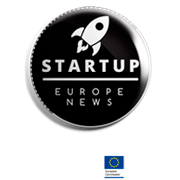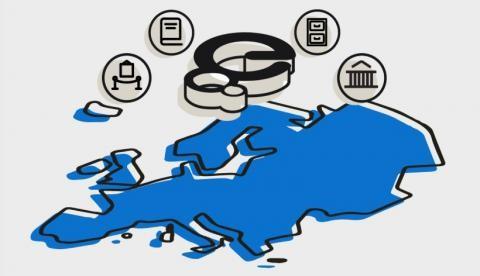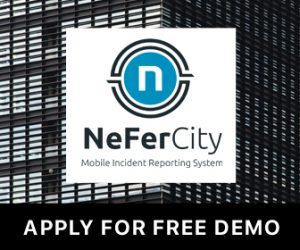The common European data space for cultural heritage is an initiative of the European Union, funded under its Digital Europe programme. It was announced in Commission Recommendation C(2021)7953 of 10 November 2021.
The call for tenders for the creation and deployment of the data space was published on 10 April 2022. The service contract was awarded to a consortium led by Europeana Foundation. It entered into force as of 20 September 2022.
The common European data space for cultural heritage supports the digital transformation of Europe’s cultural sector. It allows cultural heritage institutions across Europe to share digitised cultural heritage content, with high-quality metadata, including in 3D. It also promotes the reuse of digitised cultural heritage among various audiences, creating value for the economy and society.
The common European data space for cultural heritage builds on the Europeana Digital Service Infrastructure (Europeana DSI) and the Europeana Strategy 2020-2025. It will link to relevant European, national and regional initiatives and platforms, providing interoperable access to cultural heritage data.
The work of the consortium is supported by the Europeana Network Association (ENA), a strong and democratic community of 3,500+ experts working in the field of digital heritage, and the Europeana Aggregators’ Forum (EAF), the network of national, domain and thematic aggregators who support cultural institutions providing data.
The common European data space for cultural heritage is overseen by the Member States in the framework of the Commission Expert Group on the Common European (CEDCHE).
Four strands of work
Deployment and maintenance of the common European data space for cultural heritage is split into four work packages:
- Development and operation of the data space infrastructure;
- Integration of high-quality data;
- Capacity building and fostering reuse;
- Digital services for the public.
Development and operation of the data space infrastructure
This work package aims to provide a reliable data space infrastructure and quality of service, as well as foster innovation, interoperability and synergies with other data spaces. Its activities will include:
- expanding the existing aggregation infrastructure and services to support the growth and quality of the underlying data repository;
- improving Europeana identifiers, moving towards a permanent and reliable unique identification system for the data space to increase the accessibility, security and resilience of the data repository;
- further developing the API suite in response to identified user needs;
- preparing the data space infrastructure to further connect with the overall data space ecosystem and its underlying infrastructure.
Integration of high-quality data
This work package aims to contribute to a significant and sustained increase in high-quality, reusable and accessible data in the data space. Its activities will include:
- developing and putting in place a data governance for the common European data space for cultural heritage, extending Europeana’s framework by determining the roles, responsibilities and requirements of involved stakeholders;
- increasing the amount of high-quality data, as defined by the Europeana Publishing Framework, by at least 10% each year;
- working with the cultural heritage community, and in particular with national, thematic and domain aggregators, to determine and make available high-value cultural heritage datasets of any kind, size and nature, with particular attention to 3D data.
Capacity building and fostering reuse
This work package aims to strengthen the capacity and capabilities of professionals and reuse communities working with digital cultural heritage. Its activities include:
- developing capacity building tools and services among cultural heritage professionals to create high-quality data that can be used by a wide range of audiences;
- working with the Europeana Network Association (ENA) and the Europeana Aggregator’s Forum (EAF) to develop training, events and interaction programmes that support their members and other cultural heritage professionals to use the tools and services provided in the data space;
- developing capacity in the education, research, the creative and developer communities to facilitate the reuse of high-quality data;
- developing a solid user and market research programme to identify audience needs;
- building awareness and engagement of the activities in and around the data space and implementing a community collaboration tool.
Digital services for the public
This work package aims to engage audiences with digital cultural heritage by expanding pan-European themes and perspectives, inspiring use, reuse, and participation. Its activities include:
- delivering a high-performing and responsive website, including optimising the search and browse experience and extending ways for audiences to participate, interact and provide feedback;
- expanding multilingual coverage to include all EU official languages in the various components of the service (including website interface, editorials, search, and the underlying data);
- expanding pan-European themes and perspectives across editorial and campaigns to broaden the impact of cultural heritage;
- communicating the value and opportunities of the data space for cultural heritage activities.
Consortium partners
- Europeana Foundation
- AIT Angewandte Informationstechnik Forschungsgesellschaft mbH
- AIT Austrian Institute of Technology GmbH
- Stichting Archives Portal Europe Foundation
- Capgemini Nederland B.V
- Connecting Archaeology and Architecture in Europe
- DARIAH-ERIC
- DATOPTRON P.C.
- DFF – Deutsches Filminstitut & Filmmuseum
- European Fashion Heritage Association
- EUN Partnership AISBL
- EuroClio – European Association of History Educators
- Facts & Files Digital Services
- INCEPTION s.r.l.
- Michael Culture AISBL
- Stichting Nederlands Instituut voor Beeld en Geluid
- PHOTOCONSORTIUM -International Consortium for Photographic Heritage
- Instytut Chemii Bioorganicznej Polskiej Akademii Nauk – Poznańskie Centrum Superkomputerowo-Sieciowe (PSNC) and
- Time Machine Organisation












Show Comments